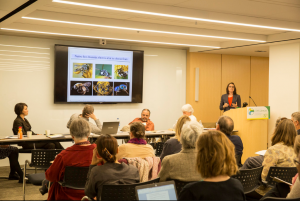First-ever Organic Confluences Summit a Resounding Success

 Scientific experts, farmers, policymakers, and organic stakeholders gathered in Washington to discuss how research on organic's positive contributions to the environment can be incorporated into government programs to improve the sustainability of U.S. agriculture. The day opened with scientific talks covering Soil Health, Water Quality, Biodiversity, Pollinator Health, Climate Change, and the Frequency of Specific Sustainability Practices used in Organic. Dr. Kathleen Delate of Iowa State University completed the round of talks with a whole system assessment of the environmental impacts of organic practices. Finally, the Organic Farming Research Foundation’s (OFRF’s) Research Program Director gave an Organic Research Needs Review based on the organization’s farmer survey on research interests and needs, with a focus on conservation and environmental science. The day continued with presentations from almost a dozen government partners on their agency or program’s environmental goals, focusing on the priorities related to improving the sustainability of U.S. agriculture. The conference concluded with break-out sessions followed by a large round-table discussion on how to increase government awareness of the role that organic can play in achieving sustainability goals, and how to incorporate these practices into agronomic sustainability programs.
Scientific experts, farmers, policymakers, and organic stakeholders gathered in Washington to discuss how research on organic's positive contributions to the environment can be incorporated into government programs to improve the sustainability of U.S. agriculture. The day opened with scientific talks covering Soil Health, Water Quality, Biodiversity, Pollinator Health, Climate Change, and the Frequency of Specific Sustainability Practices used in Organic. Dr. Kathleen Delate of Iowa State University completed the round of talks with a whole system assessment of the environmental impacts of organic practices. Finally, the Organic Farming Research Foundation’s (OFRF’s) Research Program Director gave an Organic Research Needs Review based on the organization’s farmer survey on research interests and needs, with a focus on conservation and environmental science. The day continued with presentations from almost a dozen government partners on their agency or program’s environmental goals, focusing on the priorities related to improving the sustainability of U.S. agriculture. The conference concluded with break-out sessions followed by a large round-table discussion on how to increase government awareness of the role that organic can play in achieving sustainability goals, and how to incorporate these practices into agronomic sustainability programs.
Science Supporting the Environmental Benefits of Organic featured at Summit
 Scientists from across the United States presented the latest research on how organic farming practices benefit soil health, water quality, biodiversity, and pollinators, and can contribute to climate change mitigation at The Organic Center’s Organic Confluences Conference: A Summit to Turn Environmental Evidence into Policy Practice. Here are highlights from these presentations:
Scientists from across the United States presented the latest research on how organic farming practices benefit soil health, water quality, biodiversity, and pollinators, and can contribute to climate change mitigation at The Organic Center’s Organic Confluences Conference: A Summit to Turn Environmental Evidence into Policy Practice. Here are highlights from these presentations:
Soil Health
Soil health is the basis of our food system yet many farming practices deplete soil health. The amount of soil organic carbon is perhaps one of the most important parameters for measuring soil health. Soil with more organic matter is more stable and has improved aeration, water infiltration, and water-holding capacity, and provides resilience against soil compaction. Soil organic matter also serves as a soil reserve for nutrients which compose the base of the soil food web. Long-term research studies show that organic farming systems that utilize tillage can increase soil organic matter levels even when compared with conventional no-till methods to significantly improve soil health.
Water Quality
Non-point source contamination is a major water quality concern in agricultural regions where plant nutrients – especially nitrogen – are susceptible to leaching. The Organic Water Quality experiment at the Iowa State University Agricultural and Biosystems Engineering and Agronomy Research Farm, which compares transitioning organic and conventional crop rotations and pasture systems, has found that the organic farming systems consistently reduced nitrogen runoff, with conventionally farmed plots experiencing nearly twice as much nitrogen runoff as organic plots. These results suggest that adoption of organic farming practices can play a major role in improving water quality in agricultural areas.
Biodiversity
The intensification of agriculture is one of the leading causes of biodiversity loss worldwide. Analysis of many data sets from studies conducted worldwide suggest that organic farming promotes the diversity of beneficial groups of animals such as pollinators and insect predators, but has a negligible affect on the diversity of agricultural insect pests. Furthermore, by promoting diverse and abundant assemblages of beneficial organisms on farms, organic practices provide significant increases in profitability compared to conventional agriculture by reducing the need for pest control.
Pollination
Global food security is highly dependent on pollination. Continued losses in honeybee stocks have increased food costs and compromised crop production, highlighting the importance of alternative, native pollinators that are threatened by agricultural intensification. Research has shown that organic farming methods that increase plant diversity such as planting a diversity of crops, planting hedgerows and utilizing cover crops lead to increased of farm pollination services and greater crop yield.
Climate Change Mitigation
Food production accounts for approximately 25% of global greenhouse gas emissions and is expected to increase as food production demands grow. Organic agriculture is well positioned to provide positive contributions to the reduction of greenhouse gas emissions by reducing the use of synthetic fertilizer and pesticides – the manufacturing of which comprises as much as 10% of direct global agricultural emissions. Furthermore, organic farming systems produce lower nitrous oxide emissions than conventional systems when calculated per acre. These results suggest that adoption of organic farming methods can contribute to climate change mitigation by reducing both direct and indirect sources of agricultural greenhouse gasses.
Outcomes from the Organic Confluences Summit
 Conversations and presentations from the Summit will be used to develop a White Paper that reviews the current research on environmental impacts of agricultural practices commonly used in organic, public policy agricultural goals and programs, and resources currently in place to achieve those goals. The paper will conclude with a synthesis of facilitated discussions to further incorporate environmentally friendly organic practices into federal and state sustainability incentive programs. It will create a framework to connect sustainable policy decisions and organic environmental research.
Conversations and presentations from the Summit will be used to develop a White Paper that reviews the current research on environmental impacts of agricultural practices commonly used in organic, public policy agricultural goals and programs, and resources currently in place to achieve those goals. The paper will conclude with a synthesis of facilitated discussions to further incorporate environmentally friendly organic practices into federal and state sustainability incentive programs. It will create a framework to connect sustainable policy decisions and organic environmental research.
Huge Thanks to Organic Confluences Sponsors
Thank you to the USDA Natural Resources Conservation Service, UNFI, Organic Farming Research Foundation, Stonyfield Organic, Annie’s, TRUE Organic Products Inc., Lehigh Valley Organic Growers Inc., Hidden Villa Ranch and Earthbound Farm Organic for supporting the Confluences Summit.

